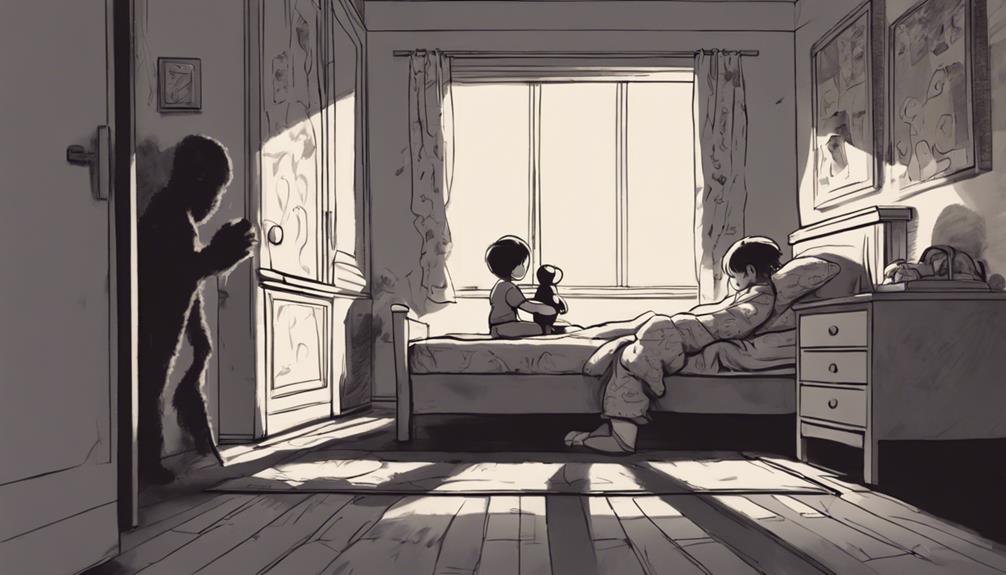Secret affairs can deeply affect children, leaving them feeling confused and betrayed. You might notice signs of anxiety or sadness, as they grapple with conflicting emotions. These experiences can strain parent-child relationships, leading to miscommunication and a sense of abandonment. Kids often struggle academically, as emotional distress distracts them from their studies. In the long term, they may carry trust issues into adulthood, impacting future relationships. Social isolation can also arise due to the stigma surrounding infidelity. Understanding these consequences is crucial for healing, and there are effective coping strategies to help navigate this challenging landscape.
Emotional Distress for Children

Children caught in the turmoil of secret affairs often experience profound emotional distress, feeling confused and betrayed by the adults they trust most. You might notice your child displaying signs of anxiety or sadness, struggling to make sense of conflicting emotions. They may wonder why their parent is acting differently or question the integrity of relationships they've held dear.
This emotional distress can impede their emotional resilience, making it challenging for them to cope with life's ups and downs. It's essential for you, as a parent, to engage in open and honest parental communication. While it's tempting to shield children from adult issues, they often sense something is wrong.
Acknowledging their feelings and providing age-appropriate explanations can help them process their emotions. Encouraging your child to express their thoughts and emotions fosters a supportive environment, enabling them to build emotional resilience. By validating their feelings and reassuring them that they're loved, you help them navigate this turbulent time.
In doing so, you not only address their immediate distress but also equip them with tools to handle future challenges, ultimately nurturing healthier emotional development.
Impact on Parent-Child Bonds
The disruption caused by secret affairs can considerably strain the bonds between parents and their children, leaving both parties feeling isolated and misunderstood.
When a parent engages in an affair, it often diverts their attention away from family dynamics and parental involvement. Children may perceive this shift as a lack of love or commitment, leading to feelings of abandonment.
You might notice that communication breaks down, as trust erodes and emotional walls build up. This disconnect can create a rift, making it harder for you to engage in meaningful conversations with your child. Your once strong relationship may feel fragile, and everyday interactions can turn tense and awkward.
Moreover, the secrecy surrounding the affair can lead to confusion. Children might sense that something is wrong but may not have the tools to articulate their feelings or seek clarity. As a result, they may withdraw or act out, further complicating the parent-child bond.
Rebuilding that bond requires intentional effort. Prioritizing open communication, honesty, and consistent parental involvement can help heal the wounds and restore trust, ultimately fostering a healthier family dynamic.
Behavioral Changes in Children

Amid the turmoil of a parent's secret affair, you might notice significant behavioral changes in kids, reflecting their confusion and emotional distress. Children often respond to such upheaval by displaying anxiety, aggression, or withdrawal, as they struggle to understand the shifting dynamics around them. These reactions can stem from disrupted attachment styles, where the security they once felt is now compromised.
Your child might mimic unhealthy relationships they've observed, influenced by parental modeling. If they see secrecy and deceit, they may internalize these behaviors as normal, leading to difficulties in forming trusting relationships in the future. They could also exhibit clinginess or fear of abandonment, reflecting their uncertainty about their parent's commitment.
It's essential to recognize these changes not just as misbehavior but as signals of their internal struggle. By fostering open communication, you can help your child articulate their feelings. Encourage them to express concerns and reassure them of your love and support.
Understanding the impact of a parent's actions can help you guide your child through this challenging time, promoting healthier attachment styles and modeling more positive relationship behaviors.
Academic Performance Decline
Experiencing a parent's secret affair can lead to a noticeable decline in academic performance, as emotional turmoil often distracts kids from their studies and daily responsibilities. You might find it hard to focus in class or keep up with assignments because your mind is preoccupied with the chaos at home. This emotional strain can severely impact your academic motivation, making it difficult to engage with your lessons or participate in discussions.
Moreover, peer comparisons can exacerbate this decline. While you observe friends excelling academically, you may feel isolated, wondering why you can't measure up. This sense of inadequacy can further erode your motivation, leading to a vicious cycle of poor performance and negative self-perception.
Teachers and parents might notice a drop in grades and participation, but they may not connect the dots to your home life. It's crucial to communicate your feelings and seek support, whether from friends, counselors, or trusted adults.
You deserve understanding and assistance during this challenging time, and addressing your struggles can help you regain your focus and restore your academic performance.
Long-Term Trust Issues

Maneuvering the aftermath of a parent's secret affair often leaves you grappling with deep-seated trust issues that can linger long into adulthood. You may find it hard to trust others, fearing betrayal even in the most benign situations. This pervasive doubt can create barriers in your relationships, making you hesitant to connect deeply with friends, partners, or even your own children.
Trust rebuilding is a gradual process, requiring patience and self-awareness. You might start by acknowledging your feelings and understanding the root of your distrust.
Communication strategies play a crucial role here; openly discussing your feelings with trusted friends or a therapist can help you articulate your fears and begin to dismantle them. Setting boundaries and expressing your need for honesty in relationships are essential steps in this journey.
Social Isolation and Stigma
When a parent's secret affair comes to light, you might find yourself feeling isolated, as if the stigma surrounding infidelity casts a shadow over your own experiences and relationships. The social stigma attached to infidelity can create a sense of shame, leading you to withdraw from friends and peers. You may worry about being judged or misunderstood, which only amplifies your isolation effects.
This situation can be especially challenging during formative years when acceptance and belonging are vital. The fear of sharing your family's struggles can lead to a sense of loneliness, making it difficult to connect with others who mightn't understand what you're going through. You might find yourself hesitating to share personal feelings or experiences, further deepening your social isolation.
Moreover, the stigma surrounding your parent's actions can create an internal conflict, as you grapple with feelings of loyalty to them while also managing your own emotional turmoil.
It's important to recognize that these feelings of isolation and stigma are valid, and you're not alone in maneuvering the complexities that arise from such circumstances. Understanding this can be the first step toward finding a path forward.
Coping Mechanisms and Support

Finding healthy coping mechanisms and support systems can be essential to steering through the emotional turbulence that arises from a parent's infidelity. You might feel a whirlwind of emotions—anger, sadness, confusion—making it vital to develop emotional resilience. This resilience helps you navigate feelings and understand that it's okay to express them.
Consider engaging in therapeutic interventions, such as counseling or support groups. Talking to a professional can provide you with tools to process your emotions and develop coping strategies tailored to your needs. In a group setting, sharing your experiences with others who understand can alleviate feelings of isolation and shame.
Journaling can also be a valuable outlet. Writing down your thoughts and feelings helps clarify your emotions and can be a healthy way to vent frustration.
Physical activities, like sports or yoga, can further boost your mood and provide a sense of control over your body and mind.
Conclusion
Steering through the fallout from secret affairs isn't easy for children.
You might notice emotional distress and shifts in behavior that affect their academic performance and relationships. These experiences can lead to long-term trust issues and feelings of isolation.
It's vital to foster open communication and provide emotional support, helping them cope with the complexities of their situation.
By addressing these challenges, you can strengthen your bond and guide them toward healthier emotional development.
